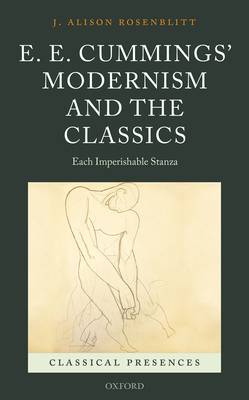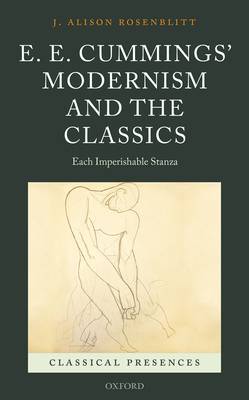
- Afhalen na 1 uur in een winkel met voorraad
- Gratis thuislevering in België vanaf € 30
- Ruim aanbod met 7 miljoen producten
- Afhalen na 1 uur in een winkel met voorraad
- Gratis thuislevering in België vanaf € 30
- Ruim aanbod met 7 miljoen producten
Zoeken
€ 217,95
+ 435 punten
Omschrijving
This volume is a major, groundbreaking study of the modernist E. E. Cummings' engagement with the classics. With his experimental form and syntax, his irreverence, and his rejection of the highbrow, there are probably few current readers who would name Cummings if asked to identify twentieth-century Anglophone poets in the classical tradition. But for most of his life, and even for ten or twenty years after his death, this is how many readers and critics did see Cummings. He specialized in the study of classical literature as an undergraduate at Harvard and his contemporaries saw him as a "pagan' poet" or a "Juvenalian" satirist, with an Aristophanic sense of humor. In E.E. Cummings' Modernism and the Classics, Alison Rosenblitt aims to recover for the contemporary reader this lost understanding of Cummings as a classicizing poet. The book also includes an edition of previously unpublished work by Cummings himself, unearthed from archival research. For the first time, the reader has access to the full scope of Cummings' translations from Horace, Homer, and Greek drama, as well as two short pieces of classically-related prose, a short "Alcaics" and a previously unknown and classicizing parody of T. S. Eliot's The Waste Land. This new work is exciting in its own right and essential to understanding Cummings' development as a poet.
Specificaties
Betrokkenen
- Auteur(s):
- Uitgeverij:
Inhoud
- Aantal bladzijden:
- 394
- Taal:
- Engels
- Reeks:
Eigenschappen
- Productcode (EAN):
- 9780198767152
- Verschijningsdatum:
- 22/11/2016
- Uitvoering:
- Hardcover
- Formaat:
- Genaaid
- Afmetingen:
- 142 mm x 224 mm
- Gewicht:
- 771 g

Alleen bij Standaard Boekhandel
+ 435 punten op je klantenkaart van Standaard Boekhandel
Beoordelingen
We publiceren alleen reviews die voldoen aan de voorwaarden voor reviews. Bekijk onze voorwaarden voor reviews.







